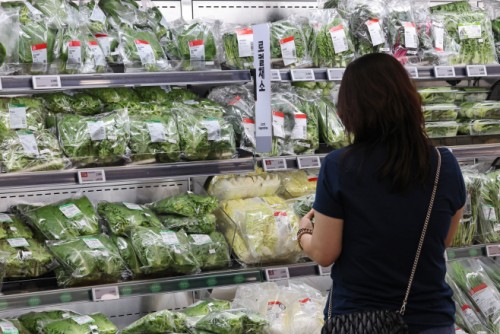 |
| A vegetable section at a large supermarket in Seoul on August 5. / Source: Yonhap News |
Producer prices in South Korea climbed for the second consecutive month in July, driven by soaring vegetable costs due to extreme weather conditions and a rebound in services and global oil prices.
According to preliminary data from the Bank of Korea released on August 21, the Producer Price Index (PPI) stood at 120.20 in July, up 0.4 percent from the previous month and 0.5 percent from a year earlier.
By sector, agriculture, forestry, and fisheries products rose 5.6 percent on-month, led by an 8.9 percent jump in crops and a 3.8 percent rise in livestock, reflecting both summer demand and supply disruptions caused by heat waves and heavy rain. Industrial goods rose 0.2 percent, with coal and petroleum products (2.2 percent) and electronic and optical equipment (0.6 percent) posting gains. In contrast, electricity, gas, water, and waste services fell 1.1 percent, dragged down by residential electricity (-12.6 percent) and industrial city gas (-5.4 percent). Service prices advanced 0.4 percent, driven by restaurants and lodging (1.1 percent) and finance and insurance (1.4 percent).
By special classification, food prices increased 2.6 percent from June, while energy fell 0.4 percent. Excluding food and energy, the index rose 0.2 percent.
The domestic supply price index, which combines domestic shipments and imports, climbed 0.8 percent on-month, led by a 4.6 percent surge in raw materials. Intermediate goods (0.4 percent) and final goods (0.5 percent) also rose. Compared with a year earlier, the index was down 1.0 percent due to lower raw materials and intermediate goods.
The total output price index, which combines domestic production and exports, rose 0.6 percent in July. Industrial goods (0.6 percent) and agricultural, forestry, and fisheries products (5.5 percent) increased, while electricity, gas, water, and waste fell 1.1 percent. Year-on-year, the index declined 0.5 percent as industrial goods slipped.
Among individual items, spinach prices skyrocketed 171.6 percent from June, while napa cabbage surged 51.7 percent. Beef (6.5 percent) and pork (4.2 percent) also rose due to increased summer holiday demand and supply shortages caused by heat-related livestock deaths.
"Spinach and napa cabbage were hit hard by heat waves and heavy rains, while beef and pork faced both stronger demand and higher death rates from the heat, leading to tighter supply," said Lee Moon-hee, head of the Bank of Korea’s Price Statistics Team, during a press briefing.
On the effect of government-issued consumer coupons to boost spending, Lee noted, "Since they were distributed only from late July, it’s difficult to gauge their impact, but expectations of stronger demand may have played a part."
Most Read
-
1
-
2
-
3
-
4
-
5
-
6
-
7





















